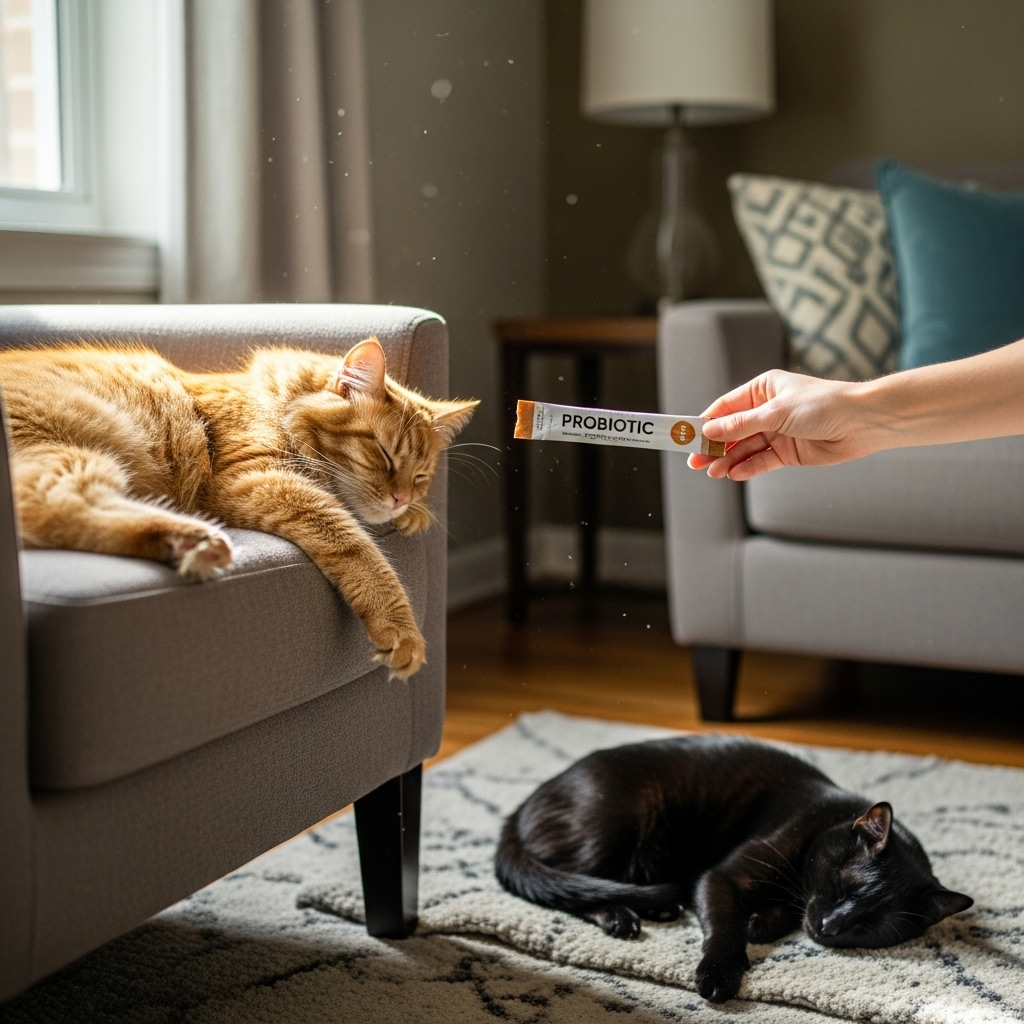Probiotics in Multi-Cat Homes: Stress Tummy Upsets

Living with multiple cats is rewarding, but it can also increase stress-related behaviors and gastrointestinal upsets. When cats are stressed by changes in routine, territory conflicts, overcrowding, or noisy households, one common outcome is a sensitive stomach—loose stools, occasional vomiting, decreased appetite, or changes in stool smell and frequency. Probiotics can be a helpful tool to support gut balance in multi-cat households, but they are not a cure-all. This article explains how probiotics work, what to look for, practical tips for using them with several cats, and when to seek veterinary care.
Why multi-cat homes often have more tummy upsets
Several factors can increase gastrointestinal issues in homes with multiple cats:
- Social stress: Competition for territory, resources, or attention raises stress hormones that affect digestion.
- Resource sharing: Multiple cats using fewer litter boxes or feeding stations may experience anxiety and interruptions during eating or toileting.
- Diet inconsistency: Different cats may prefer different foods, leading to accidental diet mixing or scavenging.
- Infectious agents: Close contact makes it easier for bacteria, viruses, or parasites to spread between cats.
- Environmental change: New pets, visitors, renovations, or altered routines can trigger short-term tummy upsets.
How probiotics can help
Probiotics are live microorganisms intended to support a healthy balance of gut bacteria. In cats they may:
- Support digestion and nutrient absorption
- Help restore intestinal balance after mild diet changes or short courses of antibiotics
- Potentially reduce frequency and severity of stress-related diarrhea for some cats
It’s important to understand that probiotics help manage or reduce symptoms in some situations but are not a replacement for diagnosing infections, parasites, or serious medical conditions. Their effectiveness varies by strain, dosage, and the individual cat.
Common probiotic strains used for cats
Pet-specific probiotics often include strains such as certain Lactobacillus, Bifidobacterium, and Enterococcus species. Many feline products are formulated with strains selected for safety and stability in animals. Use products labeled for cats or recommended by your veterinarian rather than assuming human products are appropriate.
Choosing a probiotic for multiple cats
When selecting a probiotic for a multi-cat home, consider these practical points:
- Cat-specific formula: Choose a product designed for cats or for animals. Dosage and strain selection matter.
- Packaging for multiple doses: Look for multi-dose tubs, single-dose sachets, or tablets to make consistent dosing across several cats simpler.
- Strain transparency: Good manufacturers list strains and colony-forming units (CFUs). Avoid vague labeling.
- Ease of administration: Flavored pastes, powders that mix into food, or chewable treats can be useful when dosing many cats.
- Stability & storage: Check whether refrigeration is needed and whether the product maintains potency throughout its shelf life.
Practical tips for administering probiotics in a multi-cat household
- Give probiotics at a consistent time each day—many owners mix them into the morning meal to ensure each cat gets a full dose.
- Use separate bowls or feed cats in different areas to prevent one cat from eating another’s portion.
- Introduce probiotics gradually if the product instructions recommend it, watching for any adverse reactions.
- If one cat is ill and being treated by a vet, consult about whether all cats should receive a probiotic or any other preventive treatment.
- Maintain good litter box hygiene (one box per cat plus one extra is a common guideline) and provide multiple feeding and resting areas to reduce stress.
Safety, interactions, and when probiotics are not enough
Probiotics are generally safe for healthy cats, but there are important caveats:
- Do not use probiotics as a substitute for veterinary diagnosis if a cat has ongoing vomiting, bloody stools, weight loss, severe lethargy, or other worrying signs.
- Cats with compromised immune systems or those on certain medications should be evaluated by a veterinarian before starting live microbial supplements.
- If a cat is on antibiotics, some probiotics can be used concurrently or started after a course—follow your vet’s guidance on timing and strain choice.
- A few cats may experience mild gassiness or changes in stool when first starting a probiotic; if symptoms worsen, stop and consult your vet.
Pros and Cons
| Pros | Cons |
|---|---|
| May reduce mild, stress-related diarrhea and improve stool consistency | Effectiveness varies by strain and individual cat |
| Can support recovery after minor diet changes or antibiotics | Not a substitute for veterinary diagnosis of serious conditions |
| Many formulations are easy to give to multiple cats | Some products require refrigeration or careful storage |
FAQ
Q: How long before I see improvement after starting probiotics?
A: Some cat owners notice changes within a few days; for others it may take 2–4 weeks to see a consistent improvement. If there is no improvement or if symptoms worsen, consult your veterinarian.
Q: Can I give the same probiotic to all of my cats?
A: Often yes—many products are suitable for multiple cats of similar size, but dosing may differ by weight or age. Check the label and consult your veterinarian to confirm the product and dose are appropriate for each cat.
Q: Are human probiotics safe for cats?
A: Generally it’s best to use probiotics formulated for pets. Some human probiotics may be safe, but they might not contain strains or doses optimized for cats. Ask your veterinarian before giving human supplements to a cat.
Q: When should I see a vet instead of trying probiotics at home?
A: Seek veterinary care if a cat has persistent diarrhea, bloody stools, repeated vomiting, weight loss, fever, severe lethargy, or other concerning signs. These can indicate an infection, parasites, inflammatory bowel disease, or another condition requiring medical treatment.
Key Takeaways
- Multi-cat homes can increase stress and the risk of tummy upsets through social and environmental factors.
- Probiotics may help support gut balance and reduce mild, stress-related GI upset in some cats, but results vary.
- Choose cat-specific probiotic products, follow dosing instructions, and use consistent routines to reach all cats.
- Improve the home environment—adequate litter boxes, separate feeding areas, and enrichment—to reduce stress triggers.
- Consult your veterinarian for persistent or severe symptoms, before starting probiotics for immunocompromised cats, or when combining with medications.
Disclaimer
This article provides general information and is not a substitute for professional veterinary advice. If your cat shows signs of illness, or if you have questions about starting probiotics or other supplements, consult your veterinarian for individualized recommendations. In emergencies or if your cat has severe symptoms (blood in stool, repeated vomiting, collapse, or difficulty breathing), seek immediate veterinary care.

Leave a Reply